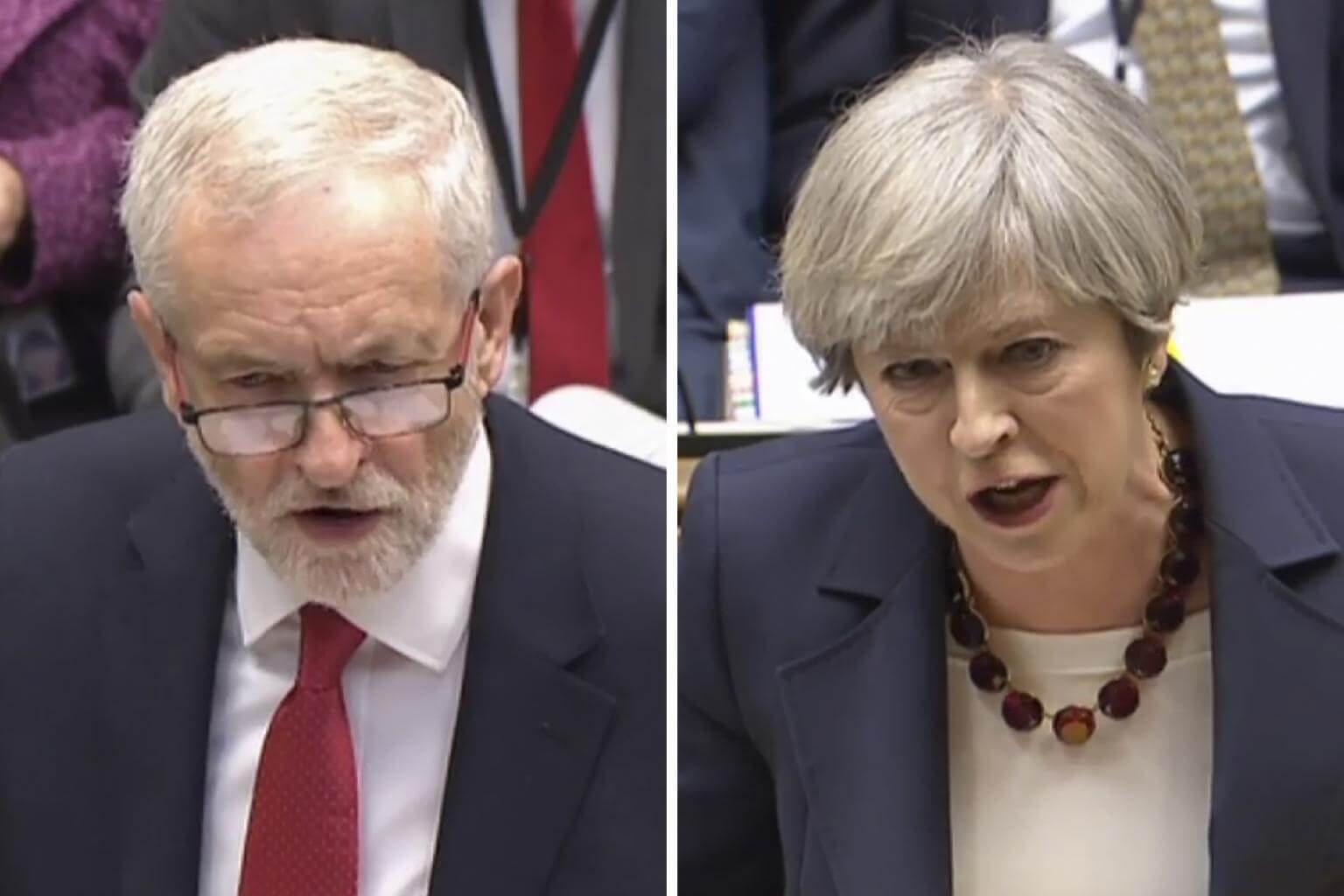British PM May's Conservatives take 23 point poll lead, matching Thatcher landslide: Poll
Sign up now: Get ST's newsletters delivered to your inbox

British Prime Minister Theresa May's (right) Conservatives take a sizeable poll lead against Jeremy Corbyn's Labour party ahead of the June election.
PHOTO: AFP/PRU
LONDON (REUTERS, BLOOMBERG) - British Prime Minister Theresa May's Conservatives have almost twice as much voter support as the opposition Labour Party ahead of a June 8 election, a lead equal to that commanded by Margaret Thatcher before her 1983 landslide victory, research organisation Ipsos MORI said.
Since May surprised rivals and financial markets by calling a snap election, opinion polls have shown May has far greater support than Labour leader Jeremy Corbyn and that she is likely to win a big majority in the 650-seat lower house of parliament.
An Ipsos MORI telephone poll of 1,004 adults conducted on April 21-25 put the Conservative lead at 23 percentage points, while a Panelbase online poll of 1,026 people on April 20-24 put their lead on 22 percentage points.
"The Conservatives are starting the campaign matching the biggest lead we have ever recorded for them during an election campaign - which was back in 1983 ahead of Thatcher's victory," Gideon Skinner, head of political research at Ipsos MORI, told Reuters.
Thatcher, riding a wave of popularity after the Falklands War against Argentina, won a 144-seat majority in that election against Labour's Michael Foot, whose left-wing socialist manifesto was branded by a party colleague as "the longest suicide note in history".
May's predecessor, David Cameron, won a majority of 12 seats in a 2015 election, the first overall Conservative victory since Thatcher's successor, John Major, won in 1992.
MAY'S GAMBLE
After winning Britain's top job in the political turmoil which followed the June 23 Brexit vote, May repeatedly ruled out a snap election until last Tuesday, when she announced outside her 10 Downing Street residence she would seek a new mandate.
May is betting that the weakness of Labour leader Corbyn and the unexpected resilience of the British economy since the Brexit vote will bolster her majority in parliament ahead of potentially disruptive EU divorce talks.
"These numbers suggest that the immediate public reaction has been just what she was probably hoping for: there are no signs of a negative reaction to her calling the election, while leadership and competence are going to be important factors in this election," said Skinner from Ipsos MORI.
The Ipsos MORI poll put May's party up 6 percentage points from March on 49 per cent, Labour down 4 percentage points on 26 per cent, the Liberal Democrats unchanged on 13 per cent and the United Kingdom Independence Party down 2 percentage points on 4 per cent.
The poll showed 61 per cent of voters thought May would be the most capable prime minister, well ahead of the 23 per cent who said Corbyn would be.
Ipsos MORI also found that 63 per cent of those expressing a voting intention had already made up their mind, with 78 per cent of Conservative voters and 56 per cent of Labour supporters saying they had made their decision.
The Panelbase poll put May's party on 49 per cent, up 10 percentage points since it last polled in January, Labour down 4 points to 27 per cent and UKIP down 9 points to 5 per cent.
Amid concerns about voter fatigue with politics after a 2014 independence referendum in Scotland, the 2015 general election and the 2016 Brexit vote, May has cautioned against complacency, saying she is not taking anything for granted.
Skinner declined to predict whether May would win a majority to rival Thatcher's more than three decades ago.
"I won't be making any projections on seats or majorities partly because it is a snap election, so it wouldn't be surprising to see some fluctuation in public opinion in the campaign," he said. "But clearly it is looking very positive for the Conservatives."
PARLIAMENT DEBATE
May and Corbyn clashed in Parliament for the last time before the June 8 election on Wednesday, rehearsing their lines of attack for the campaign.
May promised a "strong and stable" government as Britain negotiates its divorce from the European Union while Corbyn accused her of looking after the rich at the expense of the poor.
The Labour leader said the Conservative government is cutting funding for schools, hospitals and pensions, a claim she batted back with warnings about his plans for the economy.
"Every vote for him is a vote for a chaotic Brexit, every vote for me is to strengthen our hand in getting the best deal for Britain," May told lawmakers.
May, who is seeking to increase her majority by winning seats held by Labour, defended the record of Conservative-led governments since 2010 and claimed her opponents failed working people during their 13 years in office after 1997.
She returned to her theme of a "coalition of chaos" under Corbyn and lampooned division in his party.
Corbyn read a series of questions from voters - one from a young school teacher, another from an 88-year-old pensioner - to highlight cuts and declining living standards under the Conservatives.
"Strong leadership is about standing up for the many, not the few - the prime minister and Conservatives only look after the richest, not the rest," Corbyn said. "They're strong against the weak and weak against the strong."
May was asked again why she has refused to take part in television debates. She answered that she will instead be travelling around the country and that her weekly exchanges with Corbyn in the House of Commons had provided ample opportunity to see the two in action.


